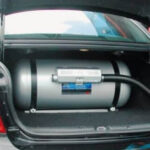Nigeria can bridge its huge public infrastructure deficit through effective project management with enormous economic and social benefits accruing thereof.
Nigeria has an infrastructure shortfall of 30 per cent of its gross domestic product (GDP), and according to the International Trade Office of the US Department of Commerce, that falls short of the international benchmark of 70% set by the World Bank.
The US organisation is concerned that with Nigeria’s population growing at a rate of over 2.5 per cent yearly, and an expected population of 400 million people by 2050, the current infrastructure in the country is likely to be overstretched. The World Bank has estimated that Nigeria will need to invest $3 trillion in over 30 years to reduce its infrastructure deficit.
This seems to be a herculean task to accomplish in the prevailing economic atmosphere in the country, hence the most expedient thing to do is install an operative and competent system of project management that enhances the lifespan of critical infrastructure.
UNDP, Swiss govt, others to partner Yobe to resettle community ruined by Boko Haram
Farmers, varsity students abducted in Borno, Katsina
The 2019 Global Competitive Index Report ranked Nigeria 130th out of 141 economies surveyed for quality infrastructure; and with a score of 48.33 out of 100 total points, the country seemed to have over 50 per cent infrastructure deficit.
Also, Nigeria was ranked 24th out of 54 African countries in the Africa Infrastructure Development Index (AIDI), 2020. With a total score of 23.26, Nigeria lags behind Egypt at 2nd place with 88.3 points, and Libya at 3rd with 82.9 points.
It is pertinent that professional bodies, especially, the Nigerian Institution of Estate Surveyors and Valuers (NIESV), or even individual estate surveyors and valuers step up their game and come up with a template that will help prolong the lifespan of public infrastructure assets in the transport, power, ICT, water and sanitation, among others.
Public infrastructure assets are the bedrock of any country’s economic advancement; so preserving such assets in good condition is critical. Infrastructure deteriorates with time and use. Poor quality infrastructure or neglected infrastructure would result in dilapidation of the assets with negative impacts on the economy, ultimately adding up to greater costs of reconstruction over time.
According to the International Monetary Fund (IMF), the objective of maintenance is to preserve an asset, not to upgrade it. It includes minor repairs (routine maintenance) and improvements (capital maintenance) to eradicate the cause of defects and to avoid excessive repetition of routine maintenance efforts.
The IMF further said many recent Public Investment Management Assessment (PIMA) reports prepared by the IMF’s Fiscal Affairs Department have shown that countries maintain little information of the current status and quality of their public infrastructure assets. As a result, the amounts allocated in the budget are often insufficient to meet even minimal levels of routine maintenance. And these inadequate budgets may be cut further during the year to make room for politically more desirable spending. On the other hand, the budgets allocated for capital maintenance are often large, a consequence of the neglect of routine maintenance.
Towards achieving this aim, the IMF advises that the relevant government bodies make reliable estimates of maintenance requirements, and put in place a comprehensive register of their fixed assets, such as buildings, roads and power lines.
“Unfortunately, infrastructure asset registers are either rarely maintained by countries or do not exist. Maintaining an asset register, backed by a condition report on each asset, is of vital importance, to reduce maintenance costs and increase the lifespan and quality of the infrastructure. The register provides a country with a record of all previous transactions pertaining to the asset, which include maintenance, modifications, and upgrades as well as performance information,” the IMF said on its website.
In the past decade, Nigeria has made concerted efforts at improving public infrastructure across some components like transport, power, ICT, and water and sanitation but it is still obvious that despite the efforts, the country still needs to catch up with 23 African countries.
Public infrastructure assets are critical social services that not only spur economic development but also stabilize the economy and spice up the socio-economic lives of citizens.
The vast infrastructure deficit has been rightly identified as one of the factors counting against sustainable economic growth in Nigeria. There have been government’s efforts to bridge the infrastructure gap but the journey seems long drawn out with the prevailing rural-urban migration and an increase in annual population growth compounding the problem.
Part of the mechanisms deployed by the government to fix the country’s infrastructure deficits is the establishment of the Economic Recovery and Growth Plan (ERGP) and the National Integrated Infrastructure Master Plan— a framework for building a resilient economy and a roadmap for building world-class infrastructures. Both, identify and elaborate on effective strategies for the successful implementation of the programmes in line with the current economic realities.
Thus, the development and maintenance of these assets need well-executed project management strategies devoid of corruption and unhealthy bureaucracy, thereby transforming Nigeria into a hub of efficient project execution.
Quadri is the General Secretary of the FCT chapter of the Nigeria Institute of Estate Surveyors and Valuers.

 Join Daily Trust WhatsApp Community For Quick Access To News and Happenings Around You.
Join Daily Trust WhatsApp Community For Quick Access To News and Happenings Around You.


